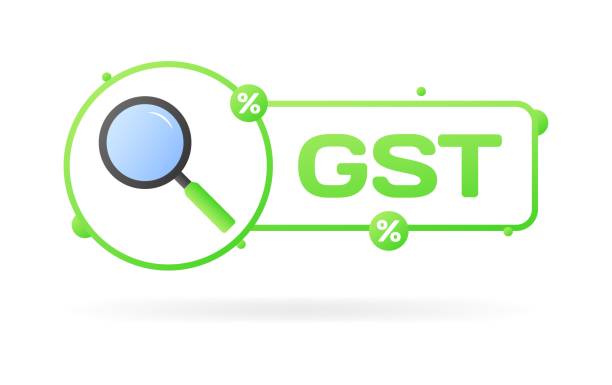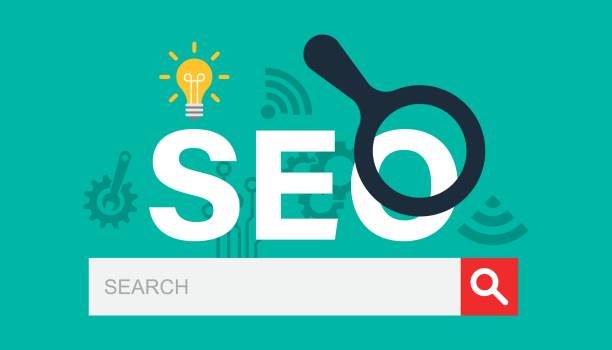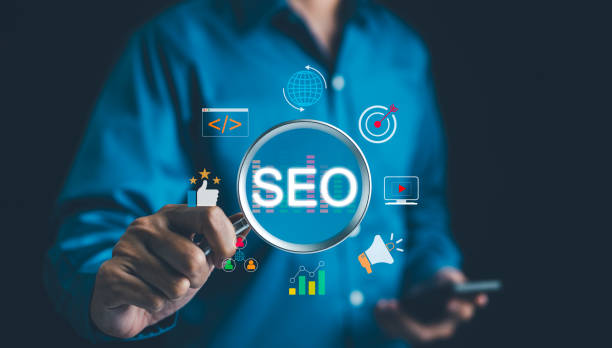Introduction to Off-Page SEO and Its Importance in Digital Success
![]()
In today’s competitive world of #digital_marketing, merely having a beautiful website is not enough; you must ensure your site is visible to your target audience.
This is where the important role of SEO or Search Engine Optimization comes to the forefront.
SEO is divided into two main parts: On-Page SEO and Off-Page SEO.
Off-Page SEO refers to all activities performed outside your website to improve its credibility and ranking in search results.
These activities primarily focus on #backlinks, but also include other elements such as brand mentions, social media marketing, and user reviews.
The importance of Off-Page SEO is that it shows search engines your website is a credible, trustworthy source with high #site_authority.
The more reputable websites link to you, the more Google recognizes you as a valuable resource, and this directly impacts your site’s #Google_ranking.
Without a strong Off-Page SEO strategy, even the best on-page content might never reach its audience.
This explains the general concept of Off-Page SEO and why every business needs it.
The ultimate goal is to increase organic traffic and, ultimately, business growth.
Understanding these basic concepts is crucial for anyone seeking success in the online space and clearly shows why investing in off-site optimization is a necessity.
Off-site SEO means structuring your website’s authority across the internet.
Does your company’s website perform as it should for your brand? In today’s competitive world, your website is your most important online tool. Rasaweb, a specialist in professional corporate website design, helps you to:
✅ Build customer credibility and trust
✅ Convert website visitors into customers
⚡ Get a free consultation!
Key Pillars of Off-Page SEO and How They Influence Ranking

Off-Page SEO encompasses a set of factors, each of which in turn affects your website’s authority and ranking.
The core and most important pillar of Off-Page SEO is backlinks.
A backlink is a link from another website to your website, and search engines interpret it as a “vote of confidence” or “endorsement” from that website.
The quality and quantity of these backlinks are very important; a backlink from a reputable and relevant website is worth far more than dozens of backlinks from low-authority and irrelevant sites.
In addition to backlinks, Brand Mentions are another important pillar of off-site optimization.
Whenever your brand or website name is mentioned in articles, forums, social networks, and other online platforms without a direct link, search engines consider it a positive signal of your popularity and credibility.
This indicates increased brand awareness and online reputation.
Social Signals, although not directly affecting ranking, can indirectly help Off-Page SEO by increasing content visibility and attracting natural backlinks.
Activity on social networks and increased content sharing can increasingly add to your website’s traffic and reputation.
This specialized section emphasizes the importance of understanding each of these components and how they work together to create a comprehensive off-page SEO strategy.
Understanding these pillars is crucial education for any SEO specialist.
Effective Strategies for Building Quality Backlinks for Off-Page SEO

Building quality and natural backlinks is one of the most challenging yet vital aspects of Off-Page SEO.
There are numerous guidelines for this, but the focus should always be on quality, not quantity.
One of the most effective methods is Content Marketing.
By producing valuable, unique, and comprehensive content that answers user questions or solves their problems, you will have a higher chance of attracting natural backlinks from other websites.
In-depth educational articles, engaging infographics, and research reports can be highly link-worthy.
Guest Blogging on relevant and reputable websites is also an excellent way to gain backlinks and increase authority.
However, make sure the content provided is genuinely valuable and not merely done for link-building purposes.
The Broken Link Building method involves finding broken links on other websites and then suggesting your content as a replacement to the website administrator.
This is a win-win strategy that helps the website administrator optimize their site and also provides you with a backlink.
Creating Resource Pages or comprehensive pages that refer to a collection of tools, articles, or useful resources in a specific field can also attract natural backlinks.
Additionally, participating in online forums and Q&A sessions related to your field and providing helpful answers along with links to reputable sources on your site can help improve your off-page SEO.
All these strategies are part of an educational approach to strengthening off-site optimization.
| Backlink Type | Description | Approximate Value |
|---|---|---|
| Editorial Link | A link naturally placed within the text of a relevant and quality article. | High |
| Resource Page Link | A link from pages that introduce a collection of valuable resources. | Medium to High |
| Guest Post Link | A link acquired by writing an article for another site and including a link within it. | Medium |
| Directory Link | A link from directory websites (must be highly reputable). | Low (if poor quality) |
Click here to preview your posts with PRO themes ››
Competitor Backlink Analysis; A Step Towards Progress in Off-Page SEO

One of the most powerful ways to improve your Off-Page SEO strategy is a detailed analysis of your main competitors’ backlink profiles.
This analytical process helps you not only identify new opportunities to gain backlinks but also assess the strengths and weaknesses of your strategies compared to competitors.
Tools like Ahrefs, SEMrush, and Moz Pro offer powerful capabilities for backlink analysis.
Using these tools, you can quickly find out which websites your competitors have received backlinks from, the quality of these links (based on Domain Authority or Domain Rating), and what type of anchor text they used for their links.
This deep analysis allows you to discover successful patterns.
For example, if you observe that a competitor has received many quality backlinks from specific news sites, you can collaborate with your PR team and look for opportunities to be featured in those media outlets.
Or, if a competitor has gained strong backlinks through guest posting on a specialized blog, you can adopt the same approach.
Furthermore, this analysis can show you which off-page SEO tactics are more effective for your industry and which are less useful.
In summary, competitor backlink analysis is not only a fundamental step in off-site optimization strategy but also provides you with a practical roadmap for outperforming them.
This analytical approach provides specialized content for improving Off-Page SEO, and it’s questionable why some businesses overlook this golden opportunity.
Did you know that a weak corporate website costs you many opportunities daily? Solve this problem forever with professional corporate website design by Rasaweb!
✅ Create a powerful and reliable image for your brand
✅ Attract targeted new customers and increase sales
⚡ [Get a free website design consultation]
Beyond Backlinks; The Role of Social Signals and Online Reputation in Off-Page SEO

Although backlinks are considered the backbone of Off-Page SEO, for a comprehensive strategy, other effective factors should not be overlooked.
Social signals and online reputation play an indirect but important role in strengthening off-page SEO.
Activity on social media, content sharing, user interaction, and increasing followers, although not directly helping Google rankings, can lead to increased visibility of your content and consequently attract natural backlinks.
Viral content on social media can be quickly re-shared by news websites or other bloggers, creating valuable links for you.
This explains a deeper understanding of social signals.
Brand Mentions, even without a link, send a strong signal to search engines that your brand is growing and popular.
The more your brand name is mentioned across different platforms, the more likely search engines are to attribute greater authority and power to it.
Online reviews and ratings, especially for local businesses, are of high importance.
Positive reviews on sites like Google My Business, Yelp, or Digikala not only attract potential customers but also show search engines that your business is reputable and trustworthy.
Responding to reviews, both positive and negative, can also significantly help your online reputation.
These factors all work synergistically with the main Off-Page SEO strategy to create a comprehensive and powerful image of your brand in the online space.
Local Off-Page SEO; Strengthening Online Presence for Local Businesses

For businesses with physical stores or services provided to customers in a specific geographical area, Local Off-Page SEO is vitally important.
This part of off-site optimization focuses on increasing business visibility in local search results, where users are looking for services or products near them.
The most important tool in this area is the Google My Business (GMB) profile.
Fully optimizing your GMB profile, including accurately entering contact information, business hours, services, and quality photos, is a fundamental step.
Collecting positive customer reviews on GMB and regularly responding to them sends a strong signal to Google that your business is active and trustworthy.
In addition to GMB, Local Citations also play a key role.
These citations include mentioning your business’s Name, Address, and Phone (NAP) in online directories, review sites, and local websites.
Ensuring the consistency and accuracy of NAP information across all platforms is very important, as any discrepancy can confuse Google and harm your local ranking.
Activity on local social networks and attracting backlinks from local websites, such as online newspapers or local community blogs, also greatly help strengthen Local Off-Page SEO.
This is an educational approach that helps businesses find more customers in the real and online worlds and strengthen their presence in off-site SEO.
Measuring and Monitoring Success in Off-Page SEO

As with any digital marketing strategy, continuous measurement and monitoring of Off-Page SEO performance are crucial to ensuring its effectiveness.
This analytical section helps you understand and track Key Performance Indicators (KPIs) for off-page SEO.
One of the most important metrics is keyword rankings in search engines.
Although backlinks do not directly change rankings, the domain authority they create allows your site to achieve better rankings for relevant keywords.
Keyword ranking tracking tools can show you these changes.
Organic Traffic, especially traffic from brand searches, is another metric.
An increase in direct searches for your brand indicates increased brand awareness, which is one of the successful outcomes of Off-Page SEO.
Domain Authority (DA) or Domain Rating (DR) are metrics provided by SEO tools (like Moz and Ahrefs) to estimate the authority and power of a website based on its backlink profile.
An increase in these metrics indicates success in your link-building campaign.
Referral Traffic is also important.
This traffic reaches your website through backlinks you’ve placed on other sites.
This not only indicates success in acquiring backlinks but can also lead to targeted traffic and conversion.
Regular monitoring of these metrics using Google Analytics and paid SEO tools allows you to optimize your strategy and maximize the return on investment in off-site optimization.
Click here to preview your posts with PRO themes ››
| Metric | Description | Importance |
|---|---|---|
| Domain Authority (DA)/Domain Rating (DR) | A domain authority score calculated by SEO tools to predict site ranking. | Very High |
| Organic Traffic (Referral Traffic) | Traffic that reaches your site from search engines or via external links. | High |
| Keyword Rankings | Your site’s position for target keywords in search results. | High |
| Brand Mentions | The number of times your brand name is mentioned online without a link. | Medium |
Common Mistakes in Off-Page SEO and How to Avoid Them

On the path to optimizing Off-Page SEO, like any other field, there are common mistakes that can severely damage your website instead of improving its ranking.
Recognizing and avoiding these mistakes is vital guidance for any SEO specialist.
One of the biggest and most dangerous mistakes is Spammy Link Building.
This includes bulk purchasing backlinks from low-quality sites, using low-tier link directories, or participating in unnatural link exchange networks.
Google severely penalizes these methods and can lead to heavy penalties, including a sharp drop in ranking or complete removal of the site from search results.
It’s questionable why some still gravitate towards these methods.
Another mistake is neglecting quality in favor of quantity.
Some people think the more backlinks they have, the better, but the reality is that even one quality backlink from a reputable website can be worth hundreds of low-quality backlinks.
Focusing on the quality of off-site optimization is far more important than its quantity.
Over-optimized Anchor Text is also a risk.
Frequent use of exact keywords in all anchor texts can be considered manipulation and lead to penalties.
Diversity in anchor text, including brand names, general phrases, naked URLs, and relevant keywords, is a more correct approach.
Lack of monitoring existing backlinks and neglecting broken or deleted links is another mistake that can harm site credibility.
To prevent these mistakes and strengthen off-page SEO, adopt a natural, ethical, and user-value-oriented approach.
Research shows that 80% of customers trust companies with professional websites more. Does your current site inspire this trust?
With Rasaweb’s corporate website design services, permanently solve the problem of lack of customer trust and a weak online image!
✅ Create a professional image and increase customer trust
✅ Attract more sales leads and grow your business
⚡ Get a free consultation
The Future of Off-Page SEO; New Trends and the Impact of Artificial Intelligence

The world of Off-Page SEO is constantly evolving, and with the emergence of new technologies, its future will also undergo significant changes.
This news section examines emerging trends and the role of Artificial Intelligence (AI) in this field.
One of the most important trends Google emphasizes is the concept of E-A-T (Expertise, Authoritativeness, Trustworthiness).
In the future, search engines will increasingly look for websites that not only have quality content but also have expert, authoritative, and trustworthy authors and sources.
This means that building an online reputation and personal or brand authority outside the site will become even more important.
The role of Artificial Intelligence is also expanding.
AI-powered tools can help with more accurate backlink profile analysis, identifying high-quality link-building opportunities, and even generating link-worthy content.
Google’s AI algorithms are becoming increasingly smarter and can identify unnatural link-building patterns with greater accuracy.
This means that black-hat link-building will become even more dangerous in the future.
Voice Search can also impact Off-Page SEO.
With the increase in voice searches, acquiring backlinks from sources that answer user questions naturally and conversationally can become important.
Ultimately, the general trend is towards a more natural, value-driven, and truly authoritative Off-Page SEO.
Brands that focus on creating excellent content, building strong relationships, and acquiring natural and organic backlinks will succeed in the long run in this entertaining yet challenging field.
Off-page SEO is no longer just about links but about building a powerful brand across the entire online space.
Click here to preview your posts with PRO themes ››
Synergy of Off-Page and On-Page SEO for Sustainable Results

While Off-Page SEO and On-Page SEO each have distinct tasks, the best results are achieved when these two components work synergistically and complement each other.
A comprehensive SEO strategy should always consider both aspects.
On-page SEO helps your website be optimized structurally and content-wise for search engines; elements like keywords, page titles, meta descriptions, URL structure, image optimization, and site loading speed are all part of on-page SEO.
When your website’s on-page SEO is strong, your content is easily crawled and indexed by search engines and is clear and relevant in terms of topic.
This provides a strong foundation for the success of Off-Page SEO.
Imagine you’ve gained many quality backlinks for a page, but that page is weak in terms of on-page SEO; for example, its content is not comprehensive enough, or its loading speed is slow.
In such a case, even the strongest backlinks alone cannot push the page to high rankings because the user experience and content relevance to keywords are not optimized.
Conversely, a website with excellent on-page SEO but without any Off-Page SEO effort might never achieve the necessary authority to compete for difficult keywords.
Quality backlinks, through link building (one of the most important elements of off-page SEO), grant authority to your website and show search engines that your internal content is worth referencing.
This specialized combination of on-page SEO and off-site optimization provides a sustainable path to achieving the highest ranks in search results and attracting targeted organic traffic.
Frequently Asked Questions (FAQs)
| Question | Answer |
|---|---|
| What is Off-Page SEO? | Off-Page SEO refers to a set of activities and methods performed outside your website to improve its ranking in search engines, such as building backlinks. |
| Why is Off-Page SEO important for a website? | Off-Page SEO shows search engines that your website is reputable, popular, and trustworthy, which helps increase domain authority and ranking. |
| What is the most important factor in Off-Page SEO? | Backlinks, or links from other sites to your site, are the most important factor, especially if they are from reputable sites. |
| What are the characteristics of a quality backlink? | A quality backlink comes from reputable sites (with high authority), is relevant to your site’s topic, and has appropriate (natural) anchor text. |
| Do social media play a role in Off-Page SEO? | Yes, sharing content on social media can help increase visibility and indirect traffic, sending positive social signals to search engines. |
| What is PBN, and is it recommended? | PBN (Private Blog Network) is a network of private websites used to build backlinks to the main site. Google considers this method spam, and its use is strongly discouraged and can lead to penalties. |
| How is Natural Link Building done? | By producing valuable and shareable content, connecting with bloggers and influencers, and attracting media attention. |
| What is Anchor Text in a backlink? | It is the text in which the link is placed. Using diverse and keyword-relevant anchor texts appears more natural and helps with SEO. |
| How is Local SEO related to Off-Page SEO? | Local SEO involves off-site activities such as registering with Google My Business, local directories, and getting online reviews, which help businesses appear in local search results. |
| How can competitor backlinks be analyzed? | By using tools like Ahrefs, Semrush, or Moz, you can analyze competitors’ backlink profiles and identify new link-building opportunities. |
And other services of Rasaweb Advertising Agency in the field of advertising
Smart Website Development: A novel service for enhancing campaign management through user experience customization.
Smart SEO: A fast and efficient solution for online growth, focusing on the use of real data.
Smart Website Development: A specialized service for growth, increasing click-through rates based on the use of real data.
Smart Brand Identity: Designed for businesses looking to improve SEO ranking through the use of real data.
Smart Social Media: A professional solution for digital branding, focusing on optimizing key pages.
And over a hundred other services in the field of internet advertising, advertising consultation, and organizational solutions
Internet Advertising | Advertising Strategy | Advertorial
Resources
? To make your business shine in the digital world and take a confident step towards the future, Rasaweb Afarin Digital Marketing Agency is by your side with its comprehensive solutions, from secure and attractive website design to SEO and content marketing. With us, experience a powerful and impactful digital presence.
📍 Tehran, Mirdamad Street, next to Bank Markazi, Southern Kazeroon Alley, Ramin Alley, No. 6





